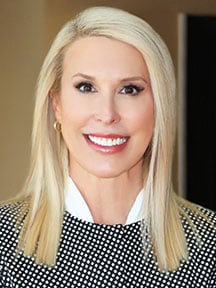
Helping Your Children Prepare for an Inheritance
Six strategies to facilitate an important – though potentially uncomfortable – conversation around inheriting wealth.
 Melanie Schmieding, CTFA, Director of Baird Family Wealth
Melanie Schmieding, CTFA, Director of Baird Family Wealth
If you’re not used to having them, conversations surrounding family wealth can be awkward (at best) and at worst lead to in-fighting and a breakdown in trust. That’s especially true when talking about inheritance: Older generations often question if their kids are ready to grow into their roles as stewards of wealth, and younger generations often let inexperience and a fear of being judged keep them from asking important questions. Melanie Schmieding, CTFA and Director of Baird Family Wealth, offered six strategies to foster communication and to keep misunderstanding from sabotaging these crucial discussions.
Co-create ground rules and norms before family meetings begin.
Remember the goal of these meetings – authentic, candid discussions around wealth, expectations and aspirations (both personal and financial). To achieve this goal, everyone needs to be engaged and feel they can be heard without judgment. Creating a structure and a space to do that beforehand can signal your commitment to having frank and open conversations.
You can use the first meeting to discuss family meeting goals, provide sample agenda topics and encourage participation. You can also set up ground rules around engagement (no technology!), listening to one another and the length and frequency of meetings.
If discussions like this are new to the family, acknowledge any discomfort.
When faced with an awkward situation, some people embrace their inner steamroller, keeping discussions superficial and cutting short others’ opinions until they reach safer ground. While conversations around wealth and an inheritance become easier the more you have them, don’t let initial discomfort cause you to ride roughshod over others’ feelings and perspectives. Calling out the discomfort can help put your family at ease and encourage more candid responses in return.
Instituting ground rules can keep uncertainty or hostility from sabotaging your meetings. Rules such as no interrupting, giving everyone an opportunity to speak and refraining from judgment can help foster a sense of security among family members.
Give everyone the time and space needed to contribute.
Even members of the same family can have wildly different personalities and communication styles – while one sibling might say whatever happens to be on his mind at any moment, another might need to consider what’s been said before she’s ready to offer her opinions. Neither style is good or bad, or right or wrong, but it’s important that the loudest voice doesn’t dominate the decision-making – especially when it comes to something that impacts everyone in the family, like an inheritance. You might not be able to rein in everyone, especially in larger families, but there are steps you can take to ensure everyone is heard.
Consider starting the meeting off with every person indicating what they hope to get out of the meeting. Build a “parking lot” for topics that need further discussion – and then follow them up at the next meeting.
Share how you feel.
Because you’re the organizer of the meeting, your family will likely look to you to lead the discussion. Use that as an opportunity to model the sorts of responses you’re looking for. Be honest about your hopes and concerns, and what being a good steward of wealth means for you – with the understanding that others might not share your feelings. By allowing yourself to feel vulnerable, and sharing that vulnerability, you’re more likely to get vulnerability and candor in return.
While everyone agrees communication is important, even the closest families struggle to do it well. We all want harmony among our loved ones, but that desire for harmony should not be an excuse to push off or shortchange potentially difficult conversations. You can have these conversations while still being thoughtful in how you broach and facilitate them.
Be self-aware – watch for reactivity and self-manage accordingly.
Conversations are easy when they’re a one-way street – it’s in the sharing of deeply held beliefs and values that emotions can rise. But remember, how you choose to react to something said is entirely up to you. Is your response going to promote further communication or shut it down? If you feel the temperature start to rise, your priority is to cool things down.
Like most things in life, children do a better job of managing something when they are prepared for it, and an inheritance is no exception. This is an opportunity to teach and for parents to say how they feel – but, crucially, to also give space for children to do the same.
Be open to making mistakes, naming them and learning from them.
We’ve all made mistakes – with money and with family relationships. This conversation is not intended to settle scores or rehash old arguments – it’s about creating a future for your family where wealth can help them achieve the things that are meaningful to them. Taking stock of the mistakes you made and sharing what you’ve learned can help keep your loved ones (and yourself) from making the same decisions. Mistakes are unavoidable, but they truly can be opportunities for growth, if you let them.
Don’t just launch into tough conversations – ease into them with examples of family successes, what are you most proud of and what you most appreciate about each other. Remember what’s ultimately behind these conversations – a desire to see your children and grandchildren succeed.
There’s a lot that can be gained from talking as a family about family wealth, such as learning how to problem-solve as a team, removing stress and uncertainty around expectations, and creating a family wealth plan that can benefit everyone. But that can only happen if these conversations take place. If you want advice on leading these discussions or would benefit from having someone who understands your family’s financial situation and values facilitate them, your Baird Financial Advisor is only a phone call away.
The information offered is provided to you for informational purposes only. Robert W. Baird & Co. Incorporated is not a legal or tax services provider and you are strongly encouraged to seek the advice of the appropriate professional advisors before taking any action. The information reflected on this page are Baird expert opinions today and are subject to change. The information provided here has not taken into consideration the investment goals or needs of any specific investor and investors should not make any investment decisions based solely on this information. Past performance is not a guarantee of future results. All investments have some level of risk, and investors have different time horizons, goals and risk tolerances, so speak to your Baird Financial Advisor before taking action.


